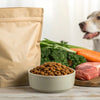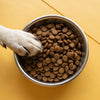What is the Best Dry Dog Food for Overweight Dogs?
- Houndsy
Table of Contents
- Introduction
- Understanding Canine Obesity
- Key Nutritional Components for Weight Loss
- Top Recommendations for Dry Dog Food for Overweight Dogs
- Practical Feeding Strategies for Weight Management
- The Importance of Veterinary Guidance
- Conclusion
- FAQs
Introduction
Did you know that nearly 45% of dogs in the U.S. are considered overweight or obese? This staggering statistic highlights a pressing issue for pet owners across the nation. Just like us, our furry companions can face serious health challenges when they carry excess weight. Conditions such as diabetes, arthritis, and heart disease are just a few of the risks associated with canine obesity. As responsible pet parents, it's crucial to address our dogs' weight concerns to enhance their quality of life and longevity.
In this blog post, we will delve into the essential factors to consider when selecting the best dry dog food for overweight dogs. You can expect to learn about the nutritional components that contribute to weight loss, how to identify high-quality products, and even some of our top recommendations. We’ll also explore practical feeding strategies and the importance of consulting with your veterinarian.
By the end of this article, we hope to empower you with the knowledge to make informed decisions about your dog's diet and feeding regimen. Let's embark on this journey together, reflecting on our own pet feeding routines and how we can improve them for the sake of our beloved pups.
Understanding Canine Obesity
The Dangers of Overweight Dogs
Carrying excess weight can have significant repercussions on a dog's health. Overweight dogs are at a higher risk for developing serious health conditions, including:
- Diabetes
- Heart disease
- Joint problems
- Certain types of cancer
These health issues can lead not only to shorter lifespans but also to decreased quality of life. Addressing obesity is not just about aesthetics; it's about ensuring our dogs live longer, healthier lives.
Causes of Weight Gain in Dogs
Understanding the reasons behind your dog's weight gain is key to preventing obesity. Common causes include:
- Overfeeding: Many owners unknowingly provide too many calories through regular meals and treats.
- Lack of exercise: Sedentary lifestyles are common, especially for dogs that spend a lot of time indoors.
- Age: Older dogs often have slower metabolisms and may need fewer calories.
- Health issues: Some medical conditions can lead to weight gain or hinder weight loss efforts.
By recognizing these factors, we can tailor our approach to better support our dogs in achieving a healthy weight.
Key Nutritional Components for Weight Loss
When selecting dry dog food for overweight dogs, it’s important to focus on specific nutritional elements that aid in weight loss. Here are the main components to consider:
High Fiber Content
Fiber plays a crucial role in weight management. It helps dogs feel full longer and supports healthy digestion. Look for foods that include highly digestible fibers, such as beet pulp or pumpkin, which can help regulate bowel movements and maintain a healthy gut.
Low-Calorie Formulas
The best dry dog food for weight loss should contain lower calories per cup. This allows you to feed your dog a satisfying portion while still promoting weight loss. Foods should ideally have:
- Fewer calories compared to standard dog food
- Reduced fat content while maintaining adequate protein levels
Lean Protein Sources
Protein is essential for muscle maintenance, especially during weight loss. Opt for foods that include high-quality lean proteins, such as chicken, turkey, or fish. These ingredients help preserve muscle mass and promote fat burning while keeping your dog satisfied.
Life Stage Considerations
Different life stages—puppy, adult, and senior—require different nutritional needs. Ensure that the food you choose is appropriate for your dog’s age and health status. For instance, senior dogs may require diets that are lower in calories but still rich in nutrients to support their aging bodies.
Quality Assurance
Choose foods that are formulated by veterinary experts and have undergone feeding trials. Look for products that meet the Association of American Feed Control Officials (AAFCO) standards to ensure your dog's nutritional needs are met.
Top Recommendations for Dry Dog Food for Overweight Dogs
Here are some highly-rated dry dog foods that meet the criteria for helping overweight dogs achieve their ideal weight:
1. Wellness CORE Weight Management
Wellness CORE Weight Management is a protein-rich option that contains fresh chicken and turkey. It’s formulated with:
- 38% protein
- 12% fat
- High fiber content
This combination helps to keep your dog feeling full while promoting muscle maintenance and fat loss.
2. Hill’s Science Diet Adult Perfect Weight
This dry food is designed specifically for weight management, featuring:
- High-quality protein
- Low-calorie content
- Rich in fiber
Hill’s Science Diet is formulated with the guidance of veterinarians and is often recommended by pet professionals.
3. Royal Canin Size Health Nutrition Weight Control
This option is tailored for different dog sizes, ensuring that both small and large breeds can benefit from weight management. It includes:
- Balanced protein and fat levels
- Special fiber blend for satiety
Royal Canin is known for its science-backed formulations that cater to specific health needs.
4. Merrick Grain-Free Healthy Weight Recipe
Merrick uses real deboned meat as the first ingredient, providing a high-quality protein source. This formula includes:
- 38% protein
- Low-calorie content
- Rich in omega fatty acids
Merrick's focus on whole foods makes this an excellent choice for health-conscious pet owners.
5. Nutro Ultra Grain-Free Weight Management
Nutro Ultra combines lean proteins with a blend of superfoods, including chia and coconut. It’s formulated with:
- 29% protein
- Reduced fat content
- No artificial preservatives or fillers
This food is designed to provide balanced nutrition while helping your dog maintain a healthy weight.
Practical Feeding Strategies for Weight Management
Portion Control
Portion control is essential in managing your dog’s weight. Start by using the feeding guidelines provided on the dog food packaging, but remember that these are general recommendations. Adjust portions based on your dog's specific needs, activity level, and weight loss goals.
Scheduled Feeding Times
Establishing a feeding schedule can help regulate your dog's eating habits. Instead of free-feeding, consider breaking down their daily food intake into two or more meals. This strategy can help prevent overeating and create a routine that your dog can rely on.
Monitor Treats and Snacks
Treats can contribute significantly to your dog’s overall calorie intake. Opt for low-calorie treats or use fruits and vegetables as healthy alternatives. Remember that treats should make up no more than 10% of your dog's daily caloric intake.
Regular Exercise
Incorporating regular physical activity is crucial for weight management. Aim for at least 30 minutes of exercise each day. This could include walks, playtime, or even interactive games that stimulate both the mind and body.
The Importance of Veterinary Guidance
Before making any changes to your dog's diet or exercise routine, it’s always best to consult with your veterinarian. They can assess your dog’s overall health, recommend specific food options, and help create a personalized weight loss plan that fits your dog's unique needs.
Conclusion
Maintaining a healthy weight is essential for our dogs' health and happiness. By understanding the nutritional components that contribute to effective weight management and carefully selecting the best dry dog food for overweight dogs, we can help our furry friends lead longer, healthier lives.
As we embark on this journey together, let’s commit to regularly monitoring our dogs’ weight and incorporating practical feeding strategies into our routines. Remember, the right food can make all the difference.
If you're looking to simplify and elevate your dog-feeding experience while ensuring your furry friend’s health, consider exploring the Houndsy Kibble Dispenser. It combines innovative design with perfect portion control to make feeding time more convenient and enjoyable for both you and your dog.
FAQs
Q: What is the best thing to feed a dog to lose weight?
A: The best way to encourage weight loss in a dog is to switch to a research-backed weight-control dog food that helps to reduce calories without negatively impacting nutrition. Look for high fiber and low-calorie options.
Q: Is wet or dry dog food better for weight loss?
A: Both wet and dry dog food can aid in weight loss, but dry food is often more convenient for portion control. Each dog is different, so consider your dog's preferences and consult your vet.
Q: When should I feed my dog weight-loss food?
A: It’s recommended to separate your dog’s daily allotted calories into two or more meals. Follow the feeding instructions provided by the manufacturer and consult your vet for the best feeding schedule.
Q: How can I determine my dog's ideal weight?
A: Consult your veterinarian to assess your dog’s ideal weight based on their breed, age, and overall health. They can help identify the appropriate weight range.
Q: How quickly should my dog lose weight?
A: Aim for a safe weight loss rate of about 1-2% of your dog’s total body weight per week. Rapid weight loss can lead to health complications.












